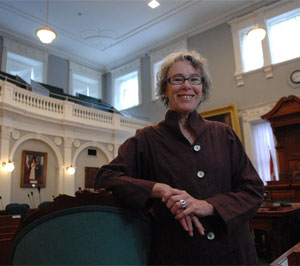 |
| Jennifer Smith at Province House. (Danny Abriel Photo) |
While most Canadians seem to develop a late interest in politics, Jennifer Smith was hooked at an early age and has spent her life dedicated to the academic study and teaching of Canadian politics. For her achievements, sheās been awarded the Eric Dennis Memorial Chair of Government and Political Science.
After obtaining a B.A. in political science at McMaster, the Ontario native moved to Nova Scotia in 1973 and earned her M.A. and Ph.D. at pilipiliĀž» as a Killam Scholar, Canadian Council Fellow and an Honorary Killam.
She was hired at pilipiliĀž» in 1980, filling the spot of the retiring Dr. J. Murray Beck, Dr. Smithās mentor. āHe was a huge influence and taught me to appreciate the need to conduct analysis on the basis of a sound knowledge of political history,ā says Dr. Smith.
Charlottetown Accord a highlight
An expert on Confederation and federalism, Dr. Smith has studied the fiercest constitutional battles in Canadian history, from repatriation in the early 1980s to the Meech Lake and Charlottetown Accords. She explains the Charlottetown Accord was a particular highlight for her career.
āI was involved in the constitutional conferences during the accord,ā she says. āSpeaking at these conferences was a very challenging, stimulating and interesting time for me.ā
Another memorable moment for Dr. Smith was when she was called as an expert witness in a P.E.I. case involving electoral boundaries in 1996. āDespite all of my preparatory work, the interrogation I had to undergo during the hearings was unlike anything I had experienced before ā it was quite fascinating indeed,ā she says.
A constant media presence, Dr. Smith rarely misses an opportunity to speak to the media on a range of Canadian political issues. āThe media work on issues like elections is fun for me and Iāve enjoyed that quite a bit,ā she explains.
Public education
āI believe work in the media is an extension of public education,ā says Dr. Smith. āI understood early that if you want to communicate clearly through the media, you have to do your homework and know your stuff to provide them with sound information and analysis.ā
This line of thinking is perhaps a telling indication of why Dr. Smith was chosen for this award.
The Eric Dennis Memorial Chair was founded by Canadian Senator William Dennis and Mrs. Dennis, in honour of their son who died during First World War. In a letter of explanation to the Board of Governors in 1918, upon bestowing the endowment, Senator Dennis pointed to Dalhousie's progressive values saying āher influence through all these years has always been on the side of sound learning, liberal and progressive thought, democratic ideals and a wholesome patriotism,ā traits that Dr. Smith considers as relevant today as they ever were.
āIām very honoured to receive this chair and feel humbled as well because of the eminence of my predecessors,ā says Dr. Smith. Those predecessors include Peter Aucoin, Gil Winham, Jim Eayrs, Jim Aitchison and R.A. MacKay, father of Andrew MacKay, President of Dalhousie from 1981 to 1986.
The chair ensures that Dr. Smith can continue her research and education, currently focused on Senate reform and the reexamination of the regimes that govern third party spending in Canada.
In addition to numerous publications on subjects ranging from Confederation to the parliamentary process she has served on numerous university committees, served as chair of the department of political science, was a director of the Canadian Political Science Association and is a board member of the Canadian Study of Parliament Group. A member of the Institute of intergovernmental Relations (IIGR) advisory council at Queenās University, she is currently editing an online series for the IIGR on potential changes to the Supreme Court of Canada.
